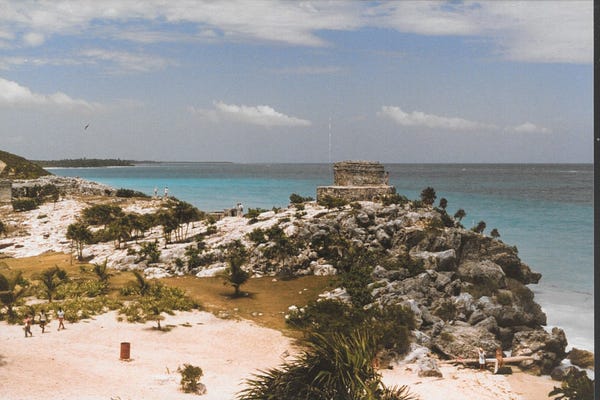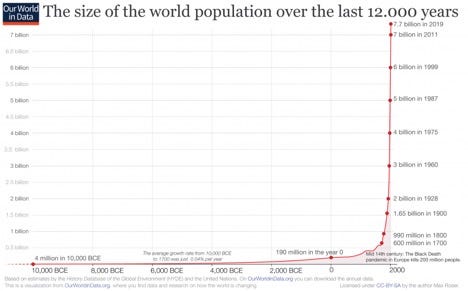Today’s Contemplation: Collapse Cometh XL
February 19, 2022

The Road Not Taken
Two roads diverged in a yellow wood,
And sorry I could not travel both
And be one traveler, long I stood
And looked down one as far as I could
To where it bent in the undergrowth;
Then took the other, as just as fair,
And having perhaps the better claim,
Because it was grassy and wanted wear;
Though as for that the passing there
Had worn them really about the same,
And both that morning equally lay
In leaves no step had trodden black.
Oh, I kept the first for another day!
Yet knowing how way leads on to way,
I doubted if I should ever come back.
I shall be telling this with a sigh
Somewhere ages and ages hence:
Two roads diverged in a wood, and I —
I took the one less traveled by,
And that has made all the difference.
-Robert Frost, 1915
While reportedly written as a joke by Frost for his hiking companion, Edward Thomas, who often struggled to pick a path among diverging ones when they were out on walks together, this poem has been commonly interpreted as a narrative about our choices and how these shape our future. The decision to take the road ‘less traveled’ versus the one ‘not taken’ speaks to the meaningful impact this seemingly innocuous choice can have upon subsequent events[1].
I was reminded of Frost’s poem and the general interpretation of it as I contemplated the request to post for a wider audience a comment I had made regarding an article someone added to a Facebook group I am a member of. In composing this ‘contemplation’ I reflected upon this request, my thoughts regarding humanity’s choices as we consider how best to deal with our existential predicament of ecological overshoot, and some of the conversations I’ve engaged in with others over the past week or so.
Given my belief that we are well into ecological overshoot having surpassed safe limits in a number of planetary boundaries[2] there are, similar to the hiker in Frost’s poem, several paths from which to choose — with slight variations to each. While the decision tree ahead of us is not entirely binary in nature, I will paint it as such for the purposes of this contemplation.
We can continue, for the most part, with business as usual: expanding our footprint on the planet with ever greater numbers and complexities. Alternatively, we can abandon this path and take a significantly different one: purposeful contraction of humanity and its complex systems.
I see the first ‘choice’ as the one we have been upon for some millennia, and one that took a dramatic shift towards a significantly greater global population and associated complex social arrangements with our leveraging of a one-time cache of finite, ancient fossil energy. When viewed over the past 12,000 years, the increase in population[3] has been nothing short of vertiginous in nature since we began employing fossil fuels, especially oil, to ‘fuel’ our growth[4]. Concomitant with this population growth has been a huge expansion of complexities to support humanity: agricultural, sociopolitical, technological, socioeconomic, scientific, etc..

It is increasingly obvious (at least to many but not all, since there are still some that completely deny the following self-evident reality) that this path is ‘problematic’ in the sense that infinite growth cannot continue for long on a finite planet, be it in the number of humans and/or the complex systems that require physical resources to support them. Call me a ‘doomer’, but I’m not buying the argument by some I’ve discussed this predicament with that we’ll just mine passing asteroids for their resources[5], including ice for water, or leave this planet to ‘colonise’ some distant ‘goldilocks’ planet just waiting for this walking, talking primate to bring ‘sustainable development/progress’ to it[6]. The ‘bargaining’ inherent is these views is simply staggering to me. Of course, I cannot predict the future any better than the next person but such beliefs leave me shaking my head at times primarily because of the magical thinking that must be employed to believe in them.
I also see this first path as the one being marketed and cheerlead by the ruling class[7], but with a slight twist: continue to pursue our current lifestyles and complexities but support them by way of a ‘new’ energy source — non-renewable renewables that are not only ‘clean/green’ but fully sustainable (while the natural phenomena that contain the energy we want to harvest are renewable — wind, solar, wave — the technologies needed to harness this energy are non-renewable since they rely upon finite resources — especially fossil fuels — for every step of their production, maintenance, and after-life disposal/reclamation).
I believe this is being sold as the best choice for a few reasons not least of which is the very real fact that it is in the best interests of those who tend to sit atop our power and wealth structures to keep the current systems in place. Because, after all, they tend to own/control/have financial stakes in the industries that stand to profit from this path. To say little about the increasing Ponzi-like structure of our economic/financial/monetary systems that require this ‘growth’ to keep from collapsing.
So, the option that increasingly appears to be being pushed by the ruling class and their narrative control managers (especially governments and mainstream media) is this ‘green/clean’ energy transition one. This is not because it actually will do what the overhyped marketing bellows constantly, but because it is the ruling class that stands to profit handsomely from the endeavour. As they always do, they are leveraging a situation to their advantage while selling a story that it is in the best interests of the masses; because, after all, the ruling class cares deeply for the people and their welfare (#sarcasm).
That many in the environmental movement have embraced such a narrative speaks to both the power of the propaganda/greenwashing/bright green lies of the ‘green/clean’ storyline but also the well-intended desire of people to act in the face of a ‘problem’. The issue I see is choosing, regardless of the best intentions, the wrong path to travel down. Yes, this is the path of least resistance as it, for the most part, supports the notion that we can transition seamlessly to a world not unlike our current one with all its energy-intensive technologies and conveniences, but with environmental ‘awareness’ and ‘cleanliness’. We’re having our energy cake and saving the planet at the same time (#sarcasm, again).
I have to call bullshit on that narrative. There are no ‘sustainable’ technologies (at least none that could support anywhere near the current world population) and there are certainly no ‘clean/green’ energy technologies[8].
For me at least, the choice of which path we need to follow is obvious: purposeful contraction of humanity and its complex systems. It needs to be purposeful if we are to have any say in how it proceeds. I am increasingly coming to the conclusion, however, given everything I have discussed above, that the path I advocate will be ‘The Road Not Taken’; at least not until nature forces us upon it and then we won’t have any say in how it unfolds.
Anyways, without further ado, here is the comment that prompted this contemplation based upon the linked article:
This author begins with a premise that indeed many still fail to grasp: climate change is but one of the existential issues the planet faces (and I would add probably not even the most pressing, with biodiversity loss and pollution loading having far surpassed safe ‘limits’ some time ago). Unfortunately, I believe the author then misses the fundamental ‘cause’ of these predicaments; rather than seeing them as symptoms of humanity overshooting the natural carrying capacity of the planet, economic and political systems are fingered as the ultimate culprit.
This misattribution then leads him to the conclusion that with the abandonment or tweaking of these systems, our various issues can be resolved. But if the real cause has been overlooked, then the shift in human systems he suggests will not resolve the issues he seeks to address.
In fact, many of those who argue along a similar line actually end up cheerleading the pursuit of changes that actually exacerbate our overshoot. They ignore the pre/historical evidence that complexity in the form of large social units (e.g., civilisations, empires, nation states, city states, etc.) and their energy and resource demands are unsustainable regardless of the economic and/or political systems employed; that all of our previous experiments with complex societies have failed because they expand and overexploit their environments, requiring them to disband or takeover un- or under-exploited regions to sustain themselves.
With the human expansion and exploitation experiment we are now entrapped within and having reached its zenith (significantly intensified by our extraction and leveraging of ancient fossil fuel energy), there is but one viable path: a dismantling of our expansion and the complexities that support it through radical degrowth. We cannot even begin to mitigate our predicament if we have identified the wrong culprits. In our motivation to ‘do something’ we are simply making the hole we are in ever deeper.
Conversations I’ve had and comments I’ve made over the past few days that demonstrate the differing perspectives on which path to trod:
Feb 11 https://www.facebook.com/groups/2213264857/posts/10158898444989858
Feb 12 https://www.facebook.com/groups/460086781192413/posts/1200265477174536/
Feb 13 (https://www.facebook.com/groups/406824673049557/posts/1564064043992275)
Feb 14
https://medium.com/age-of-awareness/complexity-revisited-2436bc93f11e
Feb 15 https://www.facebook.com/groups/460086781192413/posts/1202654196935664
Feb 16 https://www.facebook.com/groups/1295234503849294/posts/4950034151702626/
https://www.facebook.com/groups/460086781192413/posts/976797916187961/
Feb 17 https://www.facebook.com/groups/460086781192413/posts/1203885663479184
Feb 18 https://www.facebook.com/groups/460086781192413/posts/1204483863419364
Feb 19 https://www.facebook.com/groups/460086781192413/posts/1204992450035172/
[1] https://blog.prepscholar.com/robert-frost-the-road-not-taken-meaning
[2] https://stockholmresilience.org/research/planetary-boundaries.html
[3] https://ourworldindata.org/world-population-growth
[4] https://en.wikipedia.org/wiki/History_of_the_petroleum_industry
[5] https://www.bbc.com/future/article/20160103-the-truth-about-asteroid-mining
[6] https://www.howcast.com/videos/459203-how-to-colonize-a-new-planet
[7] To clarify, I use the catch-all ‘ruling class’ to help define a loose grouping of individuals/families/institutions that sit atop the power/wealth structures that have existed in every complex society throughout pre/history. With the division of labour and need for organisational structures to help coordinate them in complex societies, differences in access to power/wealth/influence developed. As our societies grew larger and more complex, so did these structures and the ‘power’ of those that occupied the upper tiers. I believe that the primary motivation of those that reside atop these structures grew to be (or perhaps always was) the continued control and/or expansion of the wealth-generation/-extraction systems that provide their revenue streams and power/prestige. Everything they do is in service of this. Everything. Whether this ‘class’ of people actually plans anything in concert with one another is certainly open for debate and interpretation, but they are certainly driven to maintain their privileged positions and all that entails.
[8] https://energyskeptic.com; https://problemspredicamentsandtechnology.blogspot.com; https://www.realgnd.org; https://www.brightgreenlies.com; https://planetofthehumans.com;